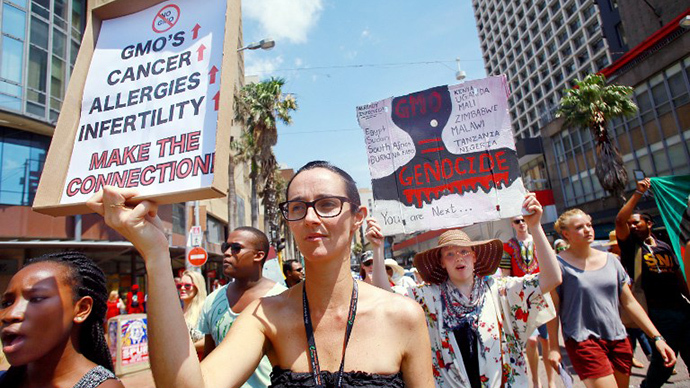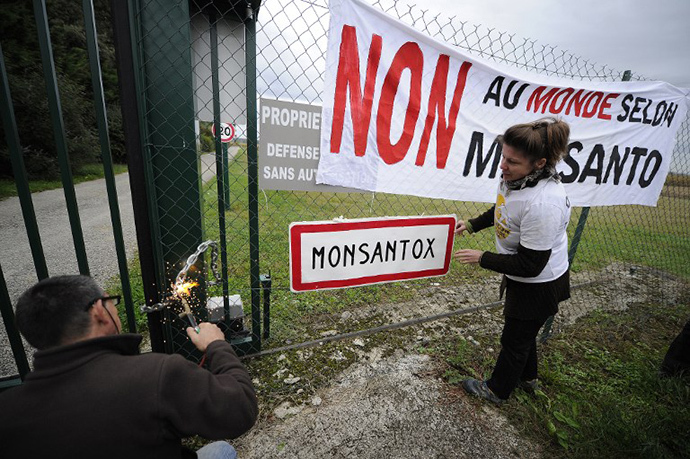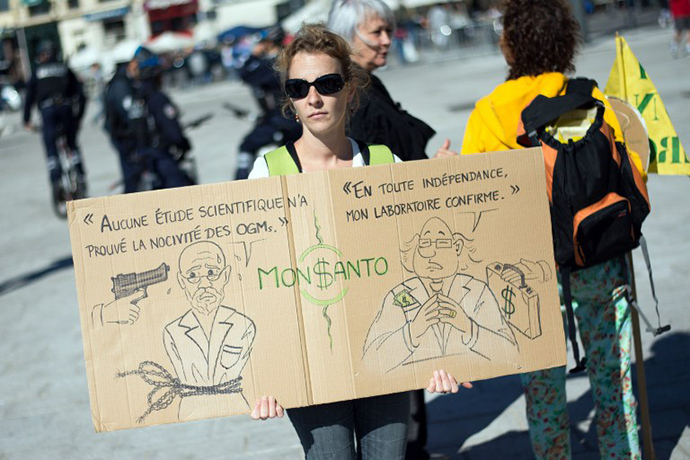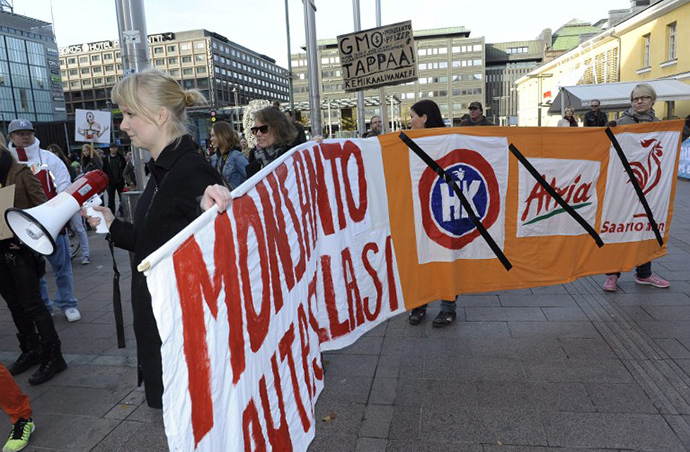Good People,
At-least some of us do speculate about those
unfinished business of Profesor Anyang Nyongo with the Genetically Modified
Foods joining with Calisto Jumas theories at the Havard University who promoted
GMO to Siaya now expanding to South Nyanza, Kwale and the rest of Africa is a
case of concern........There is one thing I know for sure, that, there is no
free land for grabbing under a democratic rule of governance..........but, where
the Corporate special interest theorists of GMO who conspire for the illegal
occupation of peoples land destroying the dignified and honorable traditional
cultural food values to be replaced by invasion of Large track of lands, could
later pose a serious risk with later causing problem with the likes of Militia
Groups who watch for special interest network and later demand illegal
settlement for public land by force over illegal deals that are not censored by
the people referendum and which backfired and are gone awry. One
such deals is already taking GMO that has been rejected by Global Community of
the world and are pushing for damping to Africa. This is not
right. It is a serious crime against humanity. Africa also must
say NO to the GMO organization feeding the world........It is because, Kenya
with the rest of Africa is no exception........and a company cannot replace
peoples collective contribution towards a sustained economic wheel for
development.
If
King Pharaoh failed in his quest for selfish greed of monopoly to control and
feed the world, this too has shown signs of failure………which is why, private
sectors cannot replace the position of Government in creating jobs.
Since the time of Pharaoh people migrated to peoples Government
control. Democracy became the law of gravity that made the wheel
of commercial principles to rotate economic progress in a sustainable
manner. The Government functionability to create jobs was proved
effective beyond reasonable doubt and job creation with innovative progress
advancement was able to provided competitive edge of challenges that are healthy
and minimized bad effects of monopoly the type of those that failed King Pharaoh and King Herod in the Bible
age.
Judy Miriga
Diaspora Spokesperson
Executive Director
Confederation Council Foundation for Africa Inc.,
USA http://socioeconomicforum50.blogspot.com
Diaspora Spokesperson
Executive Director
Confederation Council Foundation for Africa Inc.,
USA http://socioeconomicforum50.blogspot.com
-------------------------
And The Winner IS...Monsanto?
Published on Jul 8, 2013
The World Food Prize was awarded to three
top scientists who played a pivotal role in creating genetically engineered
crops, even though most countries refuse to introduce genetically engineered
crops into their food supply. The "nobel peace prize" of agriculture is awarded
to recognize "the achievements of individuals who have advanced human
development by improving the quality, quantity or availability of food in the
world". Perhaps this means Monsanto will now label their "award-winning"
creations?
Wednesday, October 16, 2013
Anyang’ Nyong’o takes leave from Senate

Kisumu Senator Prof Anyang Nyongo.
PHOTO/FILE
In Summary
- Nyong'o will be away for academic purposes and not for health reasons
- The Senator said he was leaving for Harvard University in Boston
By DENNIS ODUNGA
Kisumu Senator Prof Anyang’ Nyong’o has moved to ensure there will be no
speculation over his absence in the country, as he sought to be away for two
months.
This follows speculation over his health when he was Medical Services
minister.
Mr Nyong’o took to the floor of the Senate on Tuesday afternoon and said he
was seeking permission from the Speaker to be away for academic purposes and not
for health reasons.
“I hope this time round, there will be no speculation over my absence as it
was the case before,” he told the House.
The Senator said he was leaving for Harvard University in Boston, USA where
he would be for the next eight weeks.
“The Kisumu County Senator is leaving the country tonight for Harvard, as a
Go Brutland scholar in the school of Public Health for one semester,” the
Senator said later, in a press statement to the media.
Early this year, the country woke up to claims that the senator was taken
ill and was in ‘bad shape’ in a foreign hospital.
However, in a Facebook post
later on, Prof Nyong’o expressed gratitude for Kenyans concern and said that he
was out of the country for “personal commitments” in the UK.
&&&&&&&&&&&&&&&&&&&&&&&&&&&&&&
Profile
Calestous Juma
Professor of the Practice of International
Development
Director, Science, Technology, Globalization
Belfer Center for Science and International Affairsle
Director, Science, Technology, Globalization
Belfer Center for Science and International Affairsle
Calestous Juma is Professor
of the Practice of International Development and Director of theScience, Technology,
and Globalization Project. He directs the Agricultural
Innovation in Africa Project funded by the Bill and Melinda Gates Foundation and
serves as Faculty Chair of Innovation for Economic
Development executive program. Juma is a former Executive Secretary
of the UN Convention on Biological Diversity and Founding Director of the
African Centre for Technology Studies in Nairobi. He is co-chair of the African
Union's High-Level Panel on Science, Technology and Innovation and a jury member
of the Queen Elizabeth Prize for Engineering. He was Chancellor of the
University of Guyana and has been elected to several scientific academies
including the Royal Society of London, the US National Academy of Sciences, the
World Academy of Sciences, the UK Royal Academy of Engineering and the African
Academy of Sciences. He has won several international awards for his work on
sustainable development. He holds a doctorate in science and technology policy
studies and has written widely on science, technology, and environment. Juma
serves on the boards ofseveral international bodies andis editor of the International Journal of Technology and
Globalisation and theInternational Journal of
Biotechnology. His latest book, The New Harvest:
Agricultural Innovation in Africa, was published by Oxford
University Press in 2011. He is currently working on on books on engineering for
development and resistance to new technologies. Follow @Calestous on Twitter
===========================
Genetically Modified Food Giant Monsanto Gives Up In
Europe
The “March Against Monsanto” in 52 countries, an unapproved strain of its
genetically modified wheat growing profusely in Oregon, cancelled wheat export
orders … it’s been a rough week for Monsanto.
But now it threw in the towel in Europe, where its genetically modified
seeds have faced stiff resistance at every twist and turn.
Even its deep corporate pockets and mastery of lobbying have failed: “It’s
counterproductive to fight against windmills,” its spokesman told the Tageszeitung.
The propitious week started last Saturday with the “March Against
Monsanto,” when people in over 400 cities in 52 countries protested against the
company, its influence over governments, and its GMO seeds.
‘No
Monsanto!’: World marches against GMO food
Oct. 12, 2013





Oct. 12, 2013

Activists carry signs during a protest
against chemical giant Monsanto in Durban on October 12, 2013. (AFP Photo /
Rajesh Jantilal)
Thousands took to streets across the world’s cities on Saturday to protest
the use of GMO products, with Giant Monsanto being the main target. Over 50
countries have been taking part in the march for world food day, and across 47
different US states.
Berlin, Strasbourg, Chicago, London, Sydney and Mumbai are just a few of
the 500 cities worldwide involved in the rallies, with each one drawing
hundreds.
The demonstrators have been calling for the permanent boycott of
Genetically Modified Organisms (GMOs) and “other harmful agro-chemicals,”
according to March Against Monsanto’s official webpage. Protesters wielded large
banners denouncing GMO products, and donned fancy dress: In Washington DC a
group dressed as bees to highlight the impact of insecticides on bee
populations.

Anti-GMO (genetically modified foods)
protestors put a chain at the site entrance of US seed company Monsanto on
October 12, 2013 during a day of action against the company, in Monbequi,
southern France. Banner (R) reads: “No to a world according to Monsanto”. (AFP
Photo / Pascal Pavani)
The rallies come four days ahead of World Food Day on Oct. 16 and are a
direct attack on what the organizers term Monsanto’s “predatory business,”
genetically modified organisms (GMOs) and other harmful pesticides, which
threaten “health, fertility and longevity.”
In Berlin, people expressed displeasure at the food giant for a number of
reasons, ranging from long-term health concerns to the chemicals used in
Monsanto products.
“There a Smartstax corn that Monsanto has made…it is a corn that resists
six different types of herbicide, so you can spray it with six different
chemicals and it won’t die,” Heidi Ostermannm, a nutritionist participating in
the Berlin march told RT.
“It also produces two insecticides in its own kernels and you can’t wash it
off – I don’t even know if technically that’s food. In my mind as a
nutritionist, that’s no longer food,” she said.

Anti-genetically modified foods (GMO)
protestors demonstrate on October 12, 2013 against US agro-chemicals giant
Monsanto in the southern French city of Marseille during a day of worlwide
action against the company. (AFP Photo / Bertrand Langlois)
Dietrich Wittel, vice president of the True Food Foundation cited
experiments conducted on rats, bringing a large poster with him showing the
tumors suffered by the animals subject to being fed Monsanto corn.
“There are subtle signs of organ damage even in 90 days. But in two years,
the lifetime of a rat is shortened – they have massive organ damage, massive
breast tumors in the female rats, and that is really, really frightening,” he
said, going on to discuss the effects on larger animals.
“Recently, a study from Australia has shown that pigs that are fed these
corn products get massive stomach ulcers…. we have a much longer lifespan that a
rat. If we are waiting for cancer to show as a result of GMOs, we’ve got to
wait,” he said.

Demonstrators hold up banners to protest
against chemical giant Monsanto and its GMO (genetically modified organism)
products on October 12, 2013 in Helsinki. (AFP Photo / Heikki
Saukkomaa)
October is a particularly significant month for US protesters, as Agent
Orange Awareness Month is being promoted by the Children of Vietnam Veterans
Health Alliance (COVVHA).
“Monsanto was one of the seven chemical companies who manufactured Agent
Orange which was laced with one of the most deadly chemicals known to man,
dioxin. Monsanto, the other six companies, and the U.S. government, are
responsible for the slow burn genocide of Vietnam Veterans, their children and
grandchildren,” March Against Monsanto alleged.

Kids against GMO #MarchAgainstMonsanto #WashingtonDC
A previous anti-Monsanto protest was held in May. It started as a small
event, but turned into a global campaign with over 2 million people in 436
cities, across 52 countries, joining the rallies.
This article was posted:
Saturday, October 12, 2013 at 11:10 pm
======================================
Last month, Monsanto executive Robert Fraley received
the World Food Prize. This highly esteemed prize, considered among
many to be the “Nobel Prize” of food, was given to the chief technology officer
of the chemical company who is ironically working to diabolically destroy
agriculture as we know it. As Anthony Gucciardi puts it, the “blatant act of
transgression” isn’t only obvious to those of us in the natural health world,
but to scientists, and food and agricultural advocates around the world as
well.
In response to the award (and two other highly questionable World Food
Prize awards), 81 Councillors of the World Future Council penned a statement
blasting the World Food Prize. These dignitaries are described as “a network of
global luminaries who ‘form a voice for the rights of future generations’.” The
statement also included names of Laureates of the Right Livelihood Award, or the
“Alternative Nobel”. In other words, the statement was written by some esteemed
and globally recognized folks—people you don’t necessarily want on your bad
side.
In their statement, published in its entirety on Huffington
Post, the Council says this year’s World Food Prize recipient
“betrays the award’s own mandate to emphasize ‘the importance of a nutritious
and sustainable food supply for all people’.” They call out Monsanto Exec Fraley
and say he and the other two award recipients played crucial parts in the
development of genetically modified organisms which threaten the global food
system.
“Almost twenty years after commercialization of the first GMO seeds, by far the most widely used are not engineered to enhance nutrient content, but to produce a specific pesticide or to resist a proprietary herbicide, or a combination of these traits. Even in reducing weeds, the technology is failing, for it has led to herbicide-resistant “super weeds” now appearing on nearly half of American farms,” the Huffington Post reports.
The statement goes on to blast GMOs for perpetuating an unhealthy
dependence on fossil fuels and minerals as well as water waste. They point out
that although the award is designed to commend those behind nutritious and
sustainable food practices, Monsanto’s GMOs actually do the opposite, taxing the
environment far more than organically grown crops.
The claims by Monsanto and others who support GMOs are that these
franken-seeds can help solve world hunger. But, as the Council points out, these
seeds are largely used to produce crops for livestock feed, processed foods, and
fuel, not to feed the hungry.
In addition, they write that the practices by these companies in getting
farmers to subscribe to their devastating philosophy is making it even more
difficult for such farmers to make a living. In India, for example, 270,000
farmers committed
suicide between 1995 and 2012 to get out from under debt accumulated
by purchasing these high-dollar seeds and chemicals.
In closing, they write:
The choice of the 2013 World Food Prize is an affront to the growing international consensus on safe, ecological farming practices that have been scientifically proven to promote nutrition and sustainability. Many governments have rejected GMOs, and as many as two million citizens in 52 countries recently marched in opposition to GMOs and Monsanto. In living democracies, discounting this knowledge and these many voices is not acceptable.
Additional Sources:

No comments:
Post a Comment